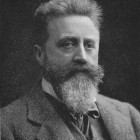Granville Bantock Suggest updates
Sir Granville Ransome Bantock.
Born London, 7 August 1868.
Died London, 11 October 1946.
English composer.
Sir Granville Bantock was a prolific composer in a late-romantic style, particularly successful with large-scale works. There are also a huge number of songs. Despite the similarity of his output to the works of Wagner and Strauss, he was quickly regarded as rather old-fashioned and until quite recently he was largely ignored.
He came from a medical family in London, his father being a distinguished surgeon, and was only after some difficulty permitted to study music. He eventually studied at the Royal Academy of Music from 1888. His first conducting job was with the George Edwardes musical comedy organization (1894). This prompted him to compose several musical comedies before the end of the century.
He consolidated his reputation as Director of Music with the Tower Orchestra, New Brighton (on the Wirral), establishing a full-sized orchestra that played lots of new music (both British and foreign, including Tchaikovsky and Rimsky-Korsakov).
In 1900 he was appointed principal of the Midland Institute School of Music in Birmingham, later, in 1908, becoming Peyton Professor of Music at the University of Birmingham, in succession to Elgar. He had a life-long fascination with Celtic folk-lore, and also enjoyed oriental subjects, composing many songs in collaboration with his wife.
Major orchestral works include Fifine at the Fair, the third of six Tone Poems completed between 1900 and 1902. He completed his Hebridean Symphony in 1913, the Pagan Symphony in 1928 and his Celtic Symphony in 1940.
His first opera, Caedmar, a student work, was first given in concert form at the Royal Academy of Music (12 July 1892), before being staged at the Crystal Palace on 18 October. His second opera, The Seal Woman, was premiered in 1924, and incorporated a number of Hebridean folk-songs. He later composed two large-scale choral works - he had begun work on The Song of Songs as early as 1912.
He composed two operas and several choral works, as well as the musical comedies - (those performed in Scotland in bold):
01 Caedmar: (London 1892) (Composer)
02 The Pearl of Iran (1894)
03 Eugene Aram (unfin 1896)
04 ABC. or Flossie the Frivolour (1898)
05 Sweet Briar (1898)
06 Harlequinade, or Only a Clown (1899)
07 The Seal Woman (Birmingham 1924) (Kennedy-Fraser)
08 The Song of Songs (Manchester 1927) (Composer)
09 The Pilgrim's Progress (London 1928) (Andrews)

